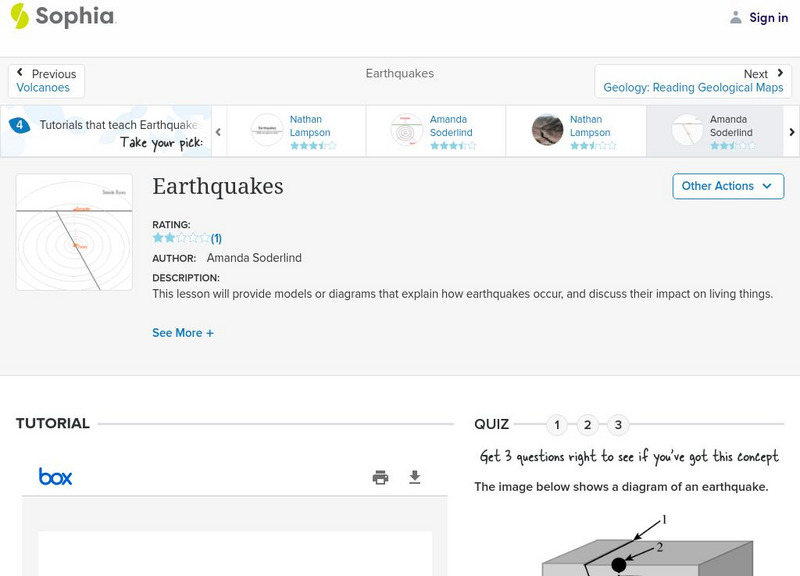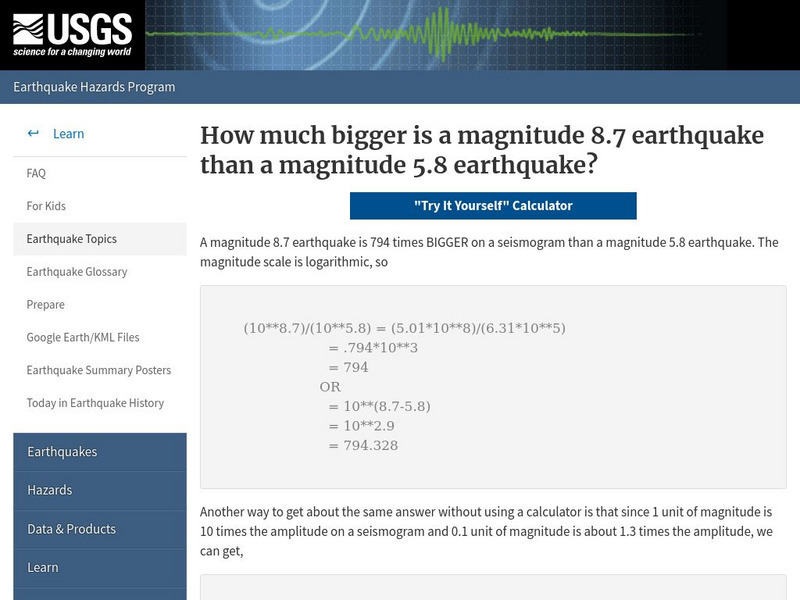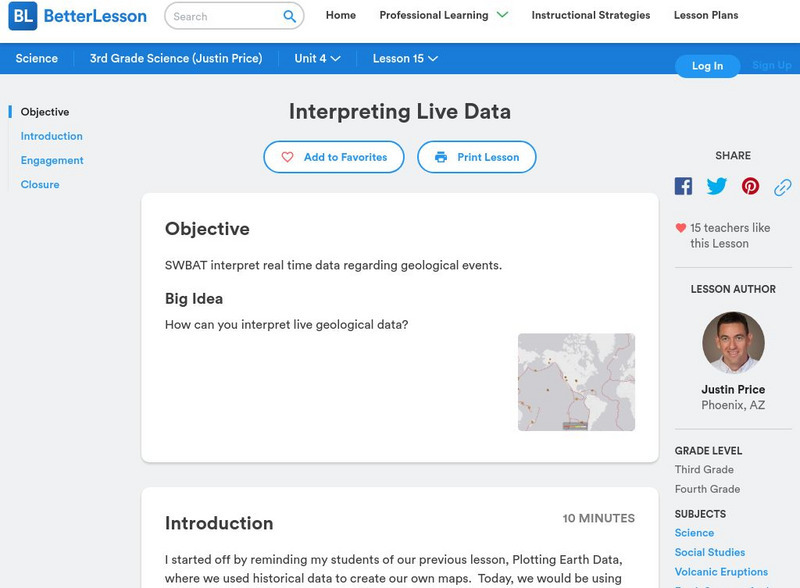Curated OER
Bigger Faults Make Bigger Earthquakes
Students experiment with string to visualize how earthquakes are created. Using various lengths of string, students determine which earthquakes lasted the longest and hypothesize why. Students look at a fault map and determine which may...
Curated OER
Explosive Ideas!
Students explore the layers of the Earth and the dynamic changes that they cause on Earth's surface. Volcanoes and earthquakes become the focus of the instructional activity as the Oregon State quarter and its Crater Lake images are...
Curated OER
Life Along the Ring of Fire
Young scholars research geological forces that create the Ring of Fire and its effects on cultures. They write reports on how natural disasters influence societies.
Curated OER
Find the Epicenter
Eighth graders visit the Virtual Earthquake Web site and complete activities that demonstrate how geologists locate the epicenters of earthquakes. The site uses actual data from historic earthquakes.
Curated OER
Earth Changes
Students investigate the earth's structural layers by participating in hands-on activities. They identify the earth's structure and investigate earthquakes.
Curated OER
Natural Disaster Blooms Taxonomy
Students complete activities that lead to greater understanding of the variety of natural disasters that occur all over the world.
Curated OER
Earthquakes!
Students experiment with the concept of earthquakes while completing a lab with marshmallows, toothpicks, modeling clay and firm Jell-O and rectangular pan. They explore what kind of soil earthquakes do the most damage in and how...
Curated OER
Earthquake Shake Table
Pupils build an earthquake shake table. They design and build the table and test their completed structures using sandbags.
Curated OER
The BIG One
Students observe an earthquake demonstration. They research an earthquake and use color dots to plot the location of each of their earthquakes on the large map.
Curated OER
Earthquake Plotting
Pupils become familiar with map coordinates. They establish the frequency of earthquake occurrences and study the location and magnitude of earthquakes. To establish the location of plate boundaries.
Curated OER
Seismic waves
Students discover the differences between P- and S-waves using a slinky. They see that when displacement occurs along a fault, the built up strain of energy is released in the form of seismic waves.
Curated OER
Earthquakes
Learners research statistics about the last five large earthquakes. They compare data in small groups and present their information orally to the class. They also attempt to predict the next large earthquake.
Curated OER
Earthquake Waves
Fourth graders pour three cups of sand on the top of a plastic table near the edge. They tap the table lightly with the rubber mallet. When they tap the table lightly they see the sand ump into the air.
Science Buddies
Science Buddies: Liquefaction & Seismic Activity
Earthquake damage can be intensified in areas that are subject to soil liquefaction. For example, in these areas, soil movement may cause foundations to collapse, while structures in nearby areas built on more stable soil or bedrock may...
Georgia Department of Education
Ga Virtual Learning: Earthquakes and the Earth's Interior
In this interactive tutorial you will learn about earthquakes and seismic waves. Learn about why and how these form and also discuss the hazards - direct and indirect - posed by earthquakes. You will then learn how our knowledge of...
Incorporated Research Institutions for Seismology
Iris: Exploring the Earth Using Seismology
The paths of some seismic waves and the ground motion that resulted are shown in this poster.
Cengage Learning
Geology Link
A geology news site that is updated daily with news on the latest geological happenings, such as earthquakes. It also has virtual field trips and a glossary of geology terms.
Science Buddies
Science Buddies:testing Compression Waves
Here's a project for studying compression waves in different soil types. It uses a homemade wave tank for solids, with a frequency generator, amplifier, and loudspeaker as the vibration source. There are lots of interesting possibilities...
Society for Science and the Public
Science News for Students: Big Rocks' Balancing Acts
Discusses research on balanced rock formations in California, which scientists believe can show information about severe earthquakes in the past, and whether certain areas are prone to them. [October 19, 2011]
Sophia Learning
Sophia: Earthquakes
A quick, introductory lesson about how earthquakes happen, and what impact these natural events have on life.
US Geological Survey
U.s. Geological Survey: How Much Bigger?
This resource provides information about the magnitude scale, and allows users to try to figure out the difference between earthquake sizes.
Better Lesson
Better Lesson: Interpreting Live Data
Learners will be using live data about volcanoes and earthquakes to look for patterns and understand why natural disasters may or may not be able to be predicted. Resources include helpful websites, a video of the lesson in action,...
University of California
Broadband Seismic Data Collection Center: Online Earthquake Quiz
Test your knowledge of earthquakes by taking this 17-question online quiz. After answering the questions, submit your results to see how you did.
CK-12 Foundation
Ck 12: Earth Science: Earthquake Safe Structures
[Free Registration/Login may be required to access all resource tools.] How buildings can be made safer from earthquakes.

























